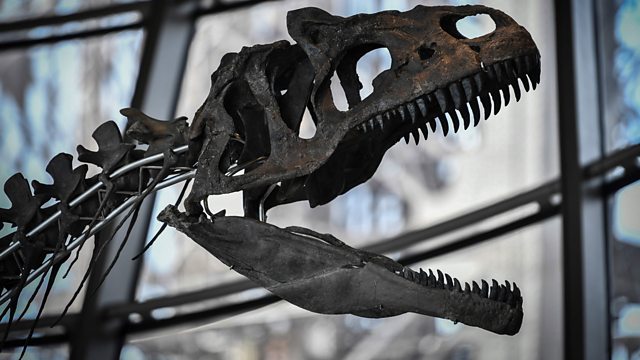
Dinosaur Auction
Dinosaur Auction; Cancer Test; Atlantic Hurricanes; Cancer Immunotherapy Treatment; Kenya Food App; The Science Of Disgust
This week an auction of a 70% complete dinosaur skeleton took place in Paris. The Therapod species, dating from the late Jurassic period about 155m years ago is scientifically very interesting. It’s an unknown predator which, argues the Society of Vertebrate Palaeontologists, is why it should not be owned by the highest bidder, but made available to palaeontologists for more scientific study. Roland Pease reports.
Cancer Test
If a doctor suspects cancer is behind a patient’s symptoms, blood tests and scans can help to detect tumours. Tiny bits of tissue can also be extracted in biopsies to see how advanced the disease is. Detecting cancer early offers a better chance of a cure. So news of a potential blood test to detect ten different types has been welcomed this week. Claudia Hammond spoke to Jacqui Shaw, Professor of Translational Cancer Genetics at Leicester University in the UK.
Atlantic Hurricanes
The 1st of June marks the start of the 2018 Atlantic hurricane season. Leading climate scientists debate whether we will see fewer or more tropical cyclones in the Atlantic as a consequence of anthropogenic climate change. There is a mounting consensus, however, that we will see more intense hurricanes. So do we need to add a more severe Category 6 to the Saffir-Simpson hurricane intensity scale? Roland Pease put this to climate scientist Michael Mann from Penn State University.
Cancer Immunotherapy Treatment
Immunotherapies for cancer have been in the news in the last week. Adam Rutherford talks to cancer researchers Sophie Papa of Kings College, London and Samra Turaljik of the Royal Marsden Hospital about the principles behind immunotherapy about the different approaches in the clinic and under clinical trials.
Kenya Food App
Getting access to loans in Kenya for small retailers can be tricky, but now cryptocurrency could solve this problem. Twiga Foods already provides marketplaces via an online platform for farmers and urban retailers. Now it is branching out to provide micro-loans secured via blockchain technology. CEO of Twiga Grant Brooke explains more to Gareth Mitchell.
The Science Of Disgust
Encouraging people to be healthier can involve gentle persuasion or giving some kind of incentive. Harnessing the most visceral of emotions – disgust – might not seem an obvious approach. Professor Val Curtis from the London School of Hygiene and Tropical Medicine has carried out an online survey in order to categorise the commonest types of disgust in order to harness its effects to fight against the spread of disease. She spoke to Claudia Hammond.
The Science Hour was presented by Marnie Chesterton with comments from Kerri Smith, Nature features editor.
Producer: Katy Takatsuki
(Image caption: A skeleton of an undeterminate carnivorous dinosaur on display at the first floor of the Eiffel Tower in Paris which went on auction © AFP / Getty Images)
Last on
More episodes
Previous
Next
Broadcast
- Sat 9 Jun 2018 11:06GMT���˿��� World Service Americas and the Caribbean
Podcast
-
![]()
Unexpected Elements
The news you know, the science you don't

